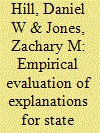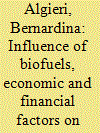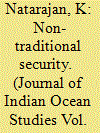|
|
|
Sort Order |
|
|
|
Items / Page
|
|
|
|
|
|
|
| Srl | Item |
| 1 |
ID:
126580


|
|
|
|
|
| Publication |
2013.
|
| Summary/Abstract |
Who do citizens blame for the recent European economic crisis? In this paper, we test theories about blame attribution with respect to the economic crisis. We argue that blame for the crisis is partially conditioned by partisan bias and framings of the crisis as being related to globalization. We test the argument with new survey data and a survey experiment from Spain. In the experiment, respondents receive different framings of the economic crisis which are endorsed by different political parties and non-partisan organizations. We obtain the following findings: (i) blame for who is responsible for the economic crisis is greatly affected by partisanship; (ii) making globalization as a cause of the crisis salient exonerates the government of blame, but only for co-partisans of the government; and (iii) citizens are willing to blame other globalization-related factors for the crisis, in particular, European governments and blame the domestic government less. The results expand our understanding of public opinion dynamics during major economic recessions and also suggest conditions under which "scapegoating" globalization can occur.
|
|
|
|
|
|
|
|
|
|
|
|
|
|
|
|
| 2 |
ID:
133949


|
|
|
|
|
| Publication |
2014.
|
| Summary/Abstract |
The empirical literature that examines cross-national patterns of state repression seeks to discover a set of political, economic, and social conditions that are consistently associated with government violations of human rights. Null hypothesis significance testing is the most common way of examining the relationship between repression and concepts of interest, but we argue that it is inadequate for this goal, and has produced potentially misleading results. To remedy this deficiency in the literature we use cross-validation and random forests to determine the predictive power of measures of concepts the literature identifies as important causes of repression. We find that few of these measures are able to substantially improve the predictive power of statistical models of repression. Further, the most studied concept in the literature, democratic political institutions, predicts certain kinds of repression much more accurately than others. We argue that this is due to conceptual and operational overlap between democracy and certain kinds of state repression. Finally, we argue that the impressive performance of certain features of domestic legal systems, as well as some economic and demographic factors, justifies a stronger focus on these concepts in future studies of repression.
|
|
|
|
|
|
|
|
|
|
|
|
|
|
|
|
| 3 |
ID:
132657


|
|
|
|
|
| Publication |
2014.
|
| Summary/Abstract |
Biofuels production has experienced rapid growth worldwide as one of the several strategies to promote green energy economies. Indeed, climate change mitigation and energy security have been frequent rationales behind biofuel policies, but biofuels production could generate negative impacts, such as additional demand for feedstocks, and therefore for land on which to grow them, with a consequent increase in food commodity prices. In this context, this paper examines the effect of biofuels and other economic and financial factors on daily returns of a group of commodity futures prices using Generalized Autoregressive Conditional Heteroskedasticity (GARCH) family models in univariate and multivariate settings. The results show that a complex of drivers are relevant in explaining commodity futures returns; more precisely, the Standard and Poor×s (S&P) 500 positively affects commodity markets, while the US/Euro exchange rate brings about a decline in commodity returns. It turns out, in addition, that energy market returns are significant in explaining commodity returns on a daily basis, while monetary liquidity is not. This would imply that biofuel policy should be carefully monitored in order to avoid excessive first-generation subsidization, which would trigger a fuel vs. food conflict.
|
|
|
|
|
|
|
|
|
|
|
|
|
|
|
|
| 4 |
ID:
120901


|
|
|
|
|
| Publication |
2013.
|
| Summary/Abstract |
The authors propose a classification of the perceived corruption levels of Mediterranean countries according to key political, economic, and social factors. While relevant empirical research has shown the extent of corruption in various countries by analyzing differences in their respective values on a corruption perceptions index, the variables used here include additional data such as gross national income per person in purchasing power parities, a political rights index, a civil liberties index, and a nonincome human development index. Although northern Mediterranean countries are distinguished from Arab and Balkan countries, the labels developed and developing countries in the Mediterranean seem too simplistic when describing the marked heterogeneity within these two groups. The lack of homogeneity can be attributed to institutional and cultural country- specific factors rather than to crude differences in levels of economic development. This suggests that policies against corruption should target a complex ensemble of driving factors not limited to the economic characteristics of an individual country and should include social political, cultural, institutional, and territorial considerations.
|
|
|
|
|
|
|
|
|
|
|
|
|
|
|
|
| 5 |
ID:
114348


|
|
|
|
|
| Publication |
2012.
|
| Summary/Abstract |
This commentary will begin by giving a background of the 'New Silk Road' and its different versions, moving on to a discussion of the geopolitical and economic factors related to it. The commentary will then try to analyse some of the critical obstacles to the 'New Silk Road' and also make recommendations for a more acceptable and feasible project within the current geopolitical set-up.
|
|
|
|
|
|
|
|
|
|
|
|
|
|
|
|
| 6 |
ID:
117750


|
|
|
| 7 |
ID:
116212


|
|
|
|
|
|
|
|